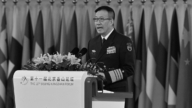【新唐人2012年1月13日訊】「唱紅打黑」的左派薄熙來受到中共媒體力挺,外界評論這增加了薄十八大入常委的機會。但薄熙來的主要對手—-廣東省委書記汪洋也不甘落後,汪洋發出豪語:廣東要成為民族復興動力。但是學者指出,中國百姓被剝奪了一切制約中共政府的權利,祈求中共內部出現「青天」,無異於望梅止渴,中國老百姓已經不再信任中共。
儘管外界對薄熙來所宣導的「唱紅打黑」頗有非議,但中共機關報《人民日報》1月9號,在頭版頭條的位置刊出長篇報導,盛讚薄熙來促進重慶共同富裕的做法,並指出,這符合胡錦濤所提倡的科學發展觀。
「美國紐約城市大學」政治學教授夏明:「工人、農民、低收入人群,他們有很多不滿,薄熙來想通過民粹主義的方式、通過民眾動員,尤其是用毛澤東的傳統的政治思想動員他們,應該說是增加了他的政治資本。」
不過由於薄熙來主要的右翼對手汪洋所在的廣東,這一年多來頻繁發生群體抗爭,而且他在處理烏坎村事件上的所謂「軟弱」表現,使他入常委的機會變得撲朔迷離。媒體甚至預測汪洋已經出局。
夏明表示,現在的中國處處充滿了憤怒,從政治、宗教、經濟等方面的抗爭都很強烈。有學者估計,每年中國的群體事件超過20萬次,所以中共最高層擔心政府的軟弱,會使事情變得愈發不可收拾,為了延長統治從而轉向力挺薄熙來。
夏明:「從胡錦濤和頂端中共領導人來看,如果走汪洋的道路,最終恐怕會把共產黨的大船翻掉,但是,他們會覺得通過薄熙來的國家主導意識形態、國家控制,同時通過打黑方式,通過政治思想、唱紅歌的方式,可以控制老百姓。」
面對困境,汪洋也不甘寂寞。1月11號,汪洋在中共廣東省政協會議上表示,廣東正處於經濟社會發展的一個「坎」上,要克服困難,使廣東在中華民族的偉大復興中繼續成為發展動力,而不是引發矛盾和問題的「導火點」。
夏明:「中國民間恐怕跟中國政府已經沒有一致的見解,也就是說,他說的中華民族復興,顯然和老百姓理解的中華民族復興是兩個不同的目標。」
夏明指出,中國經過30年發展,底層百姓得到的實惠很少,生活越來越艱難,但中國在政治上越來越專制和反動。所以,老百姓對中共沒有了信任,要自己爭取自己的權益。
不過,薄熙來為了改變他極「左」形象,提出了重慶在「十二五」期間實現「民生10條」、「共富12條」、「民主法治15條」等新口號。
夏明:「薄熙來想扮演作為中國普通老百姓良心、道德的代言人,顯然這是根本靠不住的。沒有制度保障、沒有法律和政治程序上的保障。過去60年中國共產黨的治理,都提出我是代表人民的。但是代表人民最終沒有落實,最後變成中國共產黨就是代表他自己官僚的黨國利益的。」
《星島日報》指出,薄熙來所做的一切,都是手段,目地是為了十八大入常委。正如他在會見香港媒體時說漏了嘴:「其實我就是上甚麼山唱甚麼歌」。
新唐人記者陳漢、宋風、孫寧採訪報導。
CCP Daily Promotes Chonging’s Party Chief Bo Xilai.
The Chinese Communist Party (CCP)’s mouthpiece media
has been promoting heavily Chonging’s Party Chief Bo Xilai.
Experts say this would give Bo a greater chance to enter the
Chinese Communist Party’s Standing Committee at the 18th Congress.
Meanwhile Wang Yang, Bo’s main political rival and
the governor of Guangdong Province,
claims he will turn Guangdong into the driving force of
a reviving Chinese nation.
But as experts point out, Chinese citizens have lost their trust
in the Chinese regime as their needs are not being met.
Bo Xilai’s “red-song singing and anti-mafia” campaign has
been drawing much criticism.
Perhaps that is why on Jan. 9th the People’s Daily,
the Chinese Communist Party (CCP) mouthpiece newspaper,
published a front page article giving praise to
the Party Chief of Chongqing.
The report highlighted Bo’s common wealth strategy,
saying it’s in line with President Hu Jintao’s “scientific development” concept.
Xia Ming, Political Science Prof., City University of New York:
“The workers, farmers and the underclass have accumulated much discontent.
Bo Xilai is using the populism approach, especially
Mao Zedong’s political ideology, to mobilize the masses.
With this method Bo’s political capital is increasing.”
Bo’s political rival Wang Yang, the governor of Guangdong
Province, has been dealing last year with frequent mass protests.
Apparently Wang’s “weak” handling of the Wukan village
protests has made his welcome into the Chinese communist party’s Standing Committee uncertain.
Some media experts even predict that
Wang will be out of the game.
Prof. Xia Ming says that today’s China is loaded with anger,
as protests intensify in regards to politics, religion and economy.
Some scholars estimate that over 200,000 mass protests
take place in China every year.
The Chinese regime’s top leadership are worried that it may be
all getting out of control if they show any signs of weakness.
That may be the reason why they are giving Bo Xilai
full support.
Prof. Xia Ming: “In terms of Hu Jintao and the CCP (Chinese
communist party) top leaders, Wang Yang’s path would probably end up capsizing their CCP boat.
They think that Bo Xilai’s CCP-dominated ideology and
his anti-mafia campaign and red-song singing approach, can control the masses.
Facing such predicament, Wang Yang gave a speech at the
Guangdong People’s Political Consultative Conference on Jan. 11th.
Wang claimed that Guangdong Province has been through
hardships in its economic and social development, but should get through it.
He says that Guangdong is still the driving force for
the Chinese nation’s renaissance,
rather that being the “fire point” that triggers conflicts
and problems.
Xia Ming: “I’m afraid there shouldn’t exist an identical view in
between China’s civil society and China’s regime.
That is to say, the goal of the Chinese nations’ revival
in Wang’s words,
is apparently different from the concept of the general public."
Prof. Xia Ming points out that after 30 years of development,
China’s underclass is benefiting little from it.
It is instead living with increasing hardships,
while the Chinese regime is becoming increasingly autocratic.
And so the populace has lost all trust in the CCP (Chinese
Communist Party), and have thus began to fight for their own rights and interests.
Bo Xilai has proposed new goals for Chongqing during a
Twelfth Five-Year Plan period in an attempt to change his “leftist” image.
These include “the top ten issues on people’s livelihood",
the “12 approaches to achieve common wealth",
and the “15 priorities on strengthening socialist democracy
and the rule of law”.
Prof. Xia Ming: “Bo Xilai wants to be a celebrity, endorsing
conscience and morality for the Chinese people.
It’s obviously unreliable, and it’s without an institutional guarantee,
nor any guarantee based on legal and political procedures.
Over the past 60 years of reign, the
CCP (Chinese communist party) has long claimed
it represents the people, but has never put it into practice.
In the end, the CCP has evolved into a representative of
its own bureaucratic party-state interests."
Hong Kong’s Sing Tao Daily claims that Bo Xilai is just using
some techniques in order to be included in the Standing Committee at the 2012 Chinese regime’s 18th Congress.
Apparently Bo made a slip of the tongue when talking to Hong
Kong media, when he said: “As a matter of fact, my measures may vary according to specific conditions.”
NTD reporters Chen Han, Song Feng and Sun Ning




























